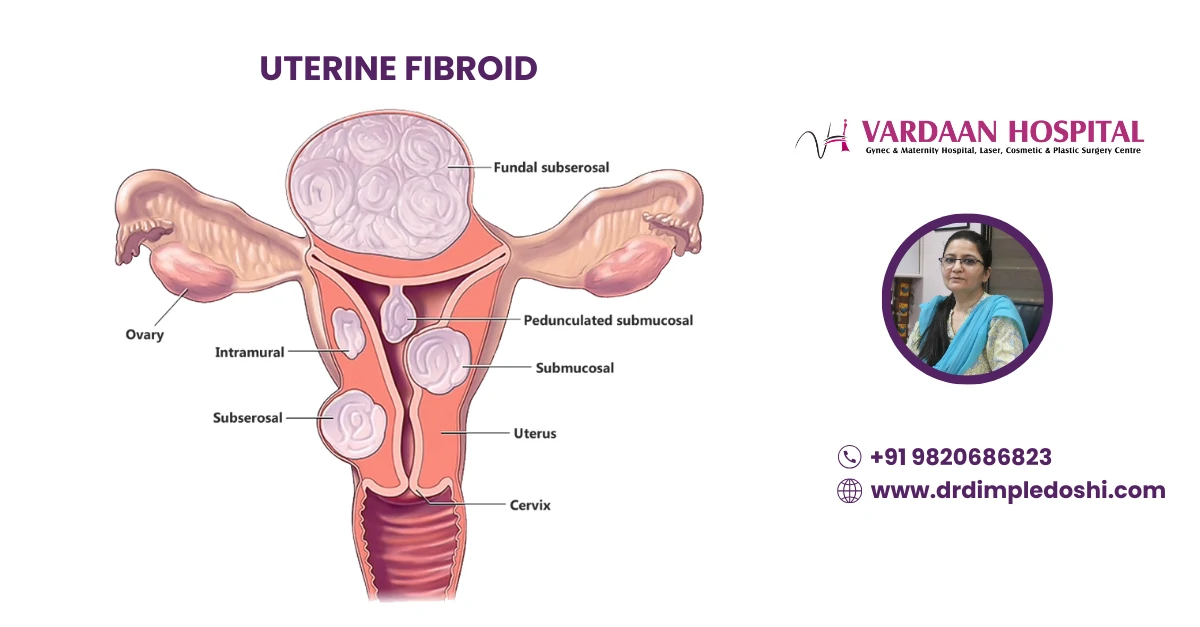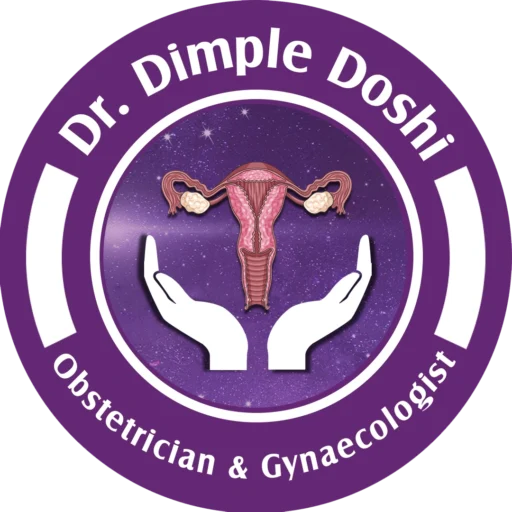Uterine Fibroid Treatment in Goregaon, Mumbai | Dr. Dimple Doshi

Table of Contents
What are uterine fibroids & what makes them so distressing?
- Are you suffering from heavy bleeding?
- Do you have constant pelvic pain which worsens during periods? Or have constant bloatedness?
- Do u suffer from frequent irritation and discomfort before or after passing urine?
- Are you having difficulty getting pregnant or having recurrent miscarriages ?
- Do u feel exhausted and tired ; left with no energy due to excessive bleeding?
Why do uterine fibroids form?
Uterine fibroids ( also known as leiomyomas, myomas, or fibromas) are benign tumors that grow from the muscle of the uterus. can sometimes be referred to by patients or other sources as:- Womb tumors
- Uterine nodules
- Muscle tumors of the uterus
- Non-cancerous uterine lumps
- Benign uterine masses
What causes uterine fibroids?
The exact cause of fibroid development is still not fully understood, but several risk factors and mechanisms have been supported by research:- Hormonal influence: Estrogen and progesterone promote fibroid growth. Fibroids rarely develop before puberty and tend to shrink after menopause.
- Genetic mutations: Up to 70% of fibroids contain mutations in the MED12 gene, as noted in studies published in the New England Journal of Medicine and PLOS One.
- Family history: Women with a first-degree relative with fibroids have a 3-fold higher risk.
- Ethnicity: Black women are 2–3 times more likely to develop fibroids, have larger fibroids, and at a younger age compared to other groups.
- Obesity and diet: Higher BMI, red meat consumption, and low fruit/vegetable intake are associated with increased risk.
- Vitamin D deficiency: Inverse association between Vitamin D levels and fibroid size was observed in recent meta-analyses.
- Environmental factors: Exposure to endocrine-disrupting chemicals like phthalates and BPA may influence fibroid development.
So in summary, the risk factors are listed above.
Risk factors:
- Early onset of menstruation
- Obesity
- Family history
- Hormonal imbalance
- Vitamin D deficiency
What types of fibroids are there and how are they staged by FIGO?
Types of fibroids:
- Intramural – Within the uterine wall
- Subserosal – On the outer surface
- Submucosal – Just beneath the uterine lining
- Pedunculated – Attached via a stalk
- Intracavitary – developing ; projecting or indenting the uterine cavity
- Cervical or parasitic – Rare types
FIGO Classification:
- Type 0–2: Submucosal
- Type 3–4: Intramural
- Type 5–7: Subserosal
- Type 8: Other (cervical/parasitic)
What symptoms do fibroids cause in women?
Most common complaints include:- Excessive or prolonged periods
- Severe menstrual cramps
- Lower abdominal pain
- Pelvic fullness and bloatedness
- Back or leg pain
- Frequent urination or constipation
- Painful intercourse
- Difficulty conceiving or repeated miscarriages
Do you need treatment for uterine fibroids?
Yes, if you:- Bleed heavily during or between periods
- Have long standing pain or pain during periods
- Are anemic or exhausted
- Plan to get pregnant but fibroids are interfering
- Have pressure symptoms from a large or bulky uterus
- Notice rapid growth post-menopause (warning sign)
How are fibroids treated at Vardan Hospital, Goregaon?
Non-surgical options:
- Hormonal therapy (oral or injectable)
- GnRH analogues
- Tranexamic acid
- Iron supplementation
Minimally invasive surgical options:
- Laparoscopic Myomectomy – Uterus-preserving surgery
- Hysteroscopic Myomectomy – For fibroids inside the uterine cavity
- Laparoscopic Hysterectomy – Complete removal if uterus is severely affected
When Is Laparotomy Needed?
- Very large fibroids (usually >10 cm or equivalent to >16-week uterus size)
- Multiple fibroids that are distorting the entire uterine contour
- Deep intramural or cervical fibroids inaccessible by minimally invasive methods
- Fibroids associated with suspected malignancy
- Severe adhesions or distorted anatomy
What is the medical line of treatment for fibroids?
Medications help control symptoms and shrink fibroids in selected cases.- Combined contraceptive pills – Reduce bleeding
- Progesterone therapies – Pills, IUDs, injections
- Tranexamic acid – Short-term control of bleeding
- GnRH analogs (e.g., Leuprolide) – Temporary shrinkage before surgery
- Selective Progesterone Receptor Modulators (SPRMs) – Where permitted; include ullipristal; mifepristone or asoprisnil
- NSAIDs – Pain relief
- Iron supplements – Correct anemia
What is the surgical journey like at Vardan Hospital?
- Day 1: Consultation, ultrasound & hormonal workup
- Day 2–3: Pre-op fitness and date scheduling
- Surgery: Performed with 3D laparoscopic system
- Hospital stay: 24–48 hours
- Recovery: Resume work in 3–7 days
- Follow-up: Healing assessment, pathology report, and emotional support
Are fibroid surgeries safe? What are the risks?
The fibroid surgeries too have their own risks and they include:- Infection
- Bleeding
- Injury to nearby organs
- Recurrence (esp. if not all fibroids removed)
What results can you expect from fibroid treatment?
- Light, regular periods
- Relief from pressure and pain
- Enhanced fertility (if uterus is preserved)
- Renewed energy and confidence
Can uterine fibroids be prevented naturally?
While not fully preventable, you can reduce your risk:- Maintain a healthy weight
- Limit red meat and processed food
- Increase Vitamin D, calcium, and fiber
- Exercise regularly
- Avoid estrogen-dominant hormonal pills unless necessary
How much does fibroid surgery cost in Mumbai?
At Vardan Hospital, Goregaon West:- Laparoscopic Myomectomy: ₹75,000–₹1,40,000
- Hysteroscopic Myomectomy: ₹55,000–₹90,000
- Laparoscopic Hysterectomy: ₹85,000–₹1,70,000
What are the ICD codes for fibroids?
- D25.0 – Submucous fibroid
- D25.1 – Intramural fibroid
- D25.2 – Subserosal fibroid
- D25.9 – Unspecified fibroid
Why choose Dr. Dimple Doshi in Goregaon for fibroid treatment?
- 28+ years of experience
- 20,000+ gynecological & laparoscopic surgeries
- Karl Storz Rubina 3D laparoscopy system
- All-women surgical and nursing team
- Trusted by women across Goregaon and Mumbai
FAQs About Uterine Fibroid Treatment
Q1. Is fibroid surgery painful?
Ans. No. With laparoscopy, pain is minimal and controlled by medication.Q2. Can I avoid hysterectomy?
Ans. Yes, many women can preserve their uterus with myomectomy.Q3. Will fibroids return after surgery?
Ans. Recurrence is possible but rare with complete removal.Q4. How soon can I conceive after fibroid removal?
Ans. Usually after 3–6 months, depending on type and healing.Book a Consultation Today
If you’re tired of suffering in silence, it’s time to take control of your health. I’m here to guide you with expertise, empathy, and evidence-based care. Visit me at Vardan Hospital, Goregaon West, Mumbai
Visit me at Vardan Hospital, Goregaon West, Mumbai
 Call/WhatsApp: +91 9820686823
Author:
Dr. Dimple Doshi, MBBS, MD, DGO
Lady Obstetrician, Gynecologist & Laparoscopic Surgeon
Founder – Vardan Hospital, Goregaon West, Mumbai
28+ years of experience | 20,000+ surgeries
Call/WhatsApp: +91 9820686823
Author:
Dr. Dimple Doshi, MBBS, MD, DGO
Lady Obstetrician, Gynecologist & Laparoscopic Surgeon
Founder – Vardan Hospital, Goregaon West, Mumbai
28+ years of experience | 20,000+ surgeries 
